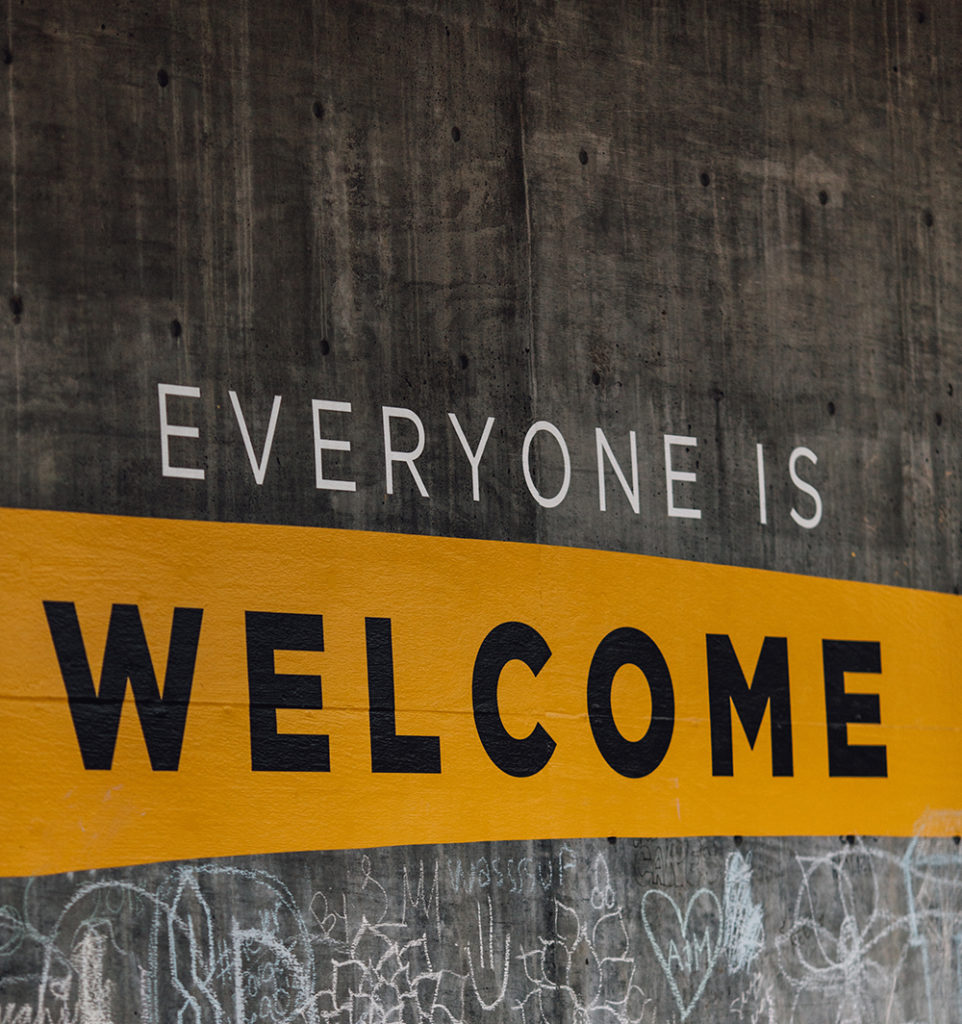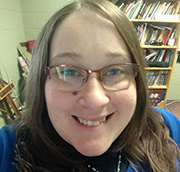by Lisa Heffernan
Just about every Sunday morning, three men from a nearby group home for adults with disabilities come to worship at the congregation I serve. Accompanied by their carer for the day, they enter the sanctuary and say hello to the ushers and me before picking up bulletins and taking their places in the pews.
It took me a little time to feel comfortable greeting and chatting with them as I would with anyone else who comes to the church doors. Even so, our weekly exchange of hellos still felt a little awkward and stilted. I just wasn’t sure how to communicate authentically with them. “What could I do differently,” I wondered, “to be a better communicator and pastor with and for them?”
In hindsight, this feels strange to admit, since I have a disability myself. Why should I feel uncomfortable around them, while expecting everyone else to feel comfortable around me?
To be perfectly honest, this remained a struggle for me. Even with all my training and interest in disability theology and ministry, I just didn’t know how to communicate with these three parishioners. What could I do differently? Well, as it turns out, I could take a note from my own experiences.
You see, I’m not the kind of person who doesn’t want you to see or notice that I have a disability. Nor do I want others to view my disability as something negative or to be pitied. My life is no more or less full because I use a wheelchair. Living with spina bifida is my reality. It’s a huge part of my identity. I would not be who I am otherwise.
And that’s when the light went on for me. Perhaps, I thought, the same is true for these three faithful neighbors who so dependably show up each week to worship at the church I serve.
 What gifts do they bring to the congregation’s life together? What could I or others in the congregation do to be more welcoming, so that any person with a disability could participate in worship and activities to the fullest?
What gifts do they bring to the congregation’s life together? What could I or others in the congregation do to be more welcoming, so that any person with a disability could participate in worship and activities to the fullest?
It’s taken building relationships with Jon*, Monte*, and Bert* to help me think through some of that. Are we best chums? Honestly, no. But each week I get to see and acknowledge Jon’s joy as he waves, smiles, and points to the hat he wears each week in support of his favorite team. Will the team win big this year, Jon? Oh, you bet! Each week I get to shake Monte’s hand and wish him well for the coming days and ask him if he will get to spend a little time with his sister and nephews. Each week, I get to remind Bert that he’s “a good person too” as he says the same of me. And we get to chat a little bit about the pride he has in his family, even though many of them have died.
Most weeks, with joy and sincerity, I get to proclaim God’s grace and love to them when I say, “This is the body of Christ, given for you” as I place the bit of communion bread in their hand. I don’t care if they can explain without error Martin Luther’s explanation of what Holy Communion means. What I care about is that they know God loves them just as they are. And, trust me, they do.
In those small exchanges, a relationship has been built with these neighbors, one that has helped me to see each one’s humanity, gifts, and abilities, as well as the ways God’s love is revealed in their relationships with one another, their carers, and all the people in their lives who embrace and accept them. It also brings me a great deal of joy to see many others in the congregation embrace them as well. It’s not unusual for the ushers to ask Jon, Bert, or Monte to assist with handing out bulletins or collecting that week’s offering. When I see that, I know that our neighbors feel welcome in worship each week. And I thank God for that.
Now, do we sometimes mess up and do things that are less than helpful in being welcoming? Absolutely. Sometimes I forget that our methods of giving and receiving Holy Communion are not always so easy when you struggle with mobility or impaired vision. At too many congregational events, Jon, Bert, and Monte find themselves along together at their own table, which breaks my heart. I suppose it other parishioners’ fear of the unknown or of not knowing how to communicate that is at the root of this.
My prayer is that I and others can become a model of hospitality for those who aren’t as comfortable spending time with them. Perhaps it will take education about disabilities too — I’m just not sure yet. What I do know is that I’m thankful for the presence of Monte, Jon, and Bert each Sunday, and for the joy and gifts they share with the community—with their community of faith.
But a recent conversation with Bert has been gnawing at me. He likes to chat with me for what seems a little too long to those who want to hustle through the greeting line at the end of worship. Sometimes I’ll chat for a minute and then gently tell him that we’ll have to talk more next week – but that Sunday, I couldn’t do that to him.
During the final hymn, Bert had come up to me with tears in his eyes and told me that he wants to be buried with his parents. It totally caught me off guard and I didn’t know what to say. I think that I thanked him for sharing something so important with me, and that I thought it was great that he still thought so much of his family as to be thinking about that. This conversation continued in the greeting line, only his tears flowed a little more at that point. Sensing the tension of his carer and of the people behind him, I reminded him that I thought it was great that he had that in mind and that it showed just how much he loved his family. With that, his carer rushed all three out the door, and I was left feeling deflated.
Thankfully, one of Bert’s other carers, a member of the congregation, was at worship on Sunday too. I asked him to check in with Bert just to make sure he was okay, and in that moment, my heart was sad for him. In that moment, the fullness of his humanity came through to me, and I silently prayed that those who help at the group home would not dismiss his grief. Bert, Jon, and Monte — they aren’t just some disabled men who show up for worship each week. They are God’s children and they have a place to belong in the congregation I serve. And I hope that, as my pastoral relationship with them continues to build, that God will grant us – all of us – the ability to embrace one another and all that we bring to the table.
*Names changed.
 The Rev. Lisa Heffernan, 32, serves as the solo pastor of Trinity Lutheran Church in Chamberlain, S.D. She is also a member of the ELCA Disability Ministries team.
The Rev. Lisa Heffernan, 32, serves as the solo pastor of Trinity Lutheran Church in Chamberlain, S.D. She is also a member of the ELCA Disability Ministries team.


Thank you for sharing. I have fostered with differently abled children and adults. It saddens me to see how the experience of joy, unconditional love & appreciation that comes from interacting with them is missed by those who avoid them.
Society needs to be more aware of those with hidden disabilities e.g. ADHD, Autism, & Learning disabilities also. Interaction and guidance are helpful.
Helping those with love leading with social skill challenges and behaviors to know what is helpful for them in social situations is a blessing to them.
Many are not clueless, but cueless as learning social skills must be taught to most. Showing acceptance, empathy and caring rather than judgment and avoidance end up being rewarding to those care to be there for them.
Pastor Heffernan is a marvelous writer and fine pastor. Please invite her to write often. This article shows how absolutely every congregation can purposely invite people with all kinds of disabilities to their community and then welcome them and their gifts.
Thank you for this great reminder that we are all God’s children..